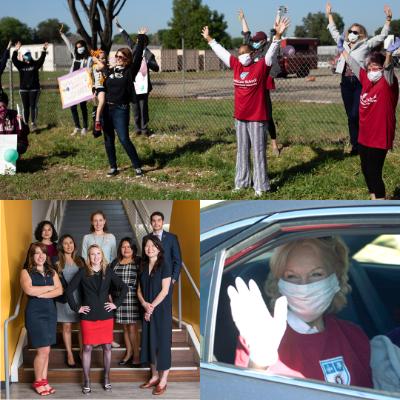In the face of an unprecedented global health emergency, the Loyola Social Justice Law Clinic (LSJLC) has become an even more vital resource for the legal needs of underserved communities.

“What do you do when they won’t even let you in the courthouse?” asked Paula Mitchell, legal director of the Loyola Project for the Innocent (LPI).
One week into California’s “Safer at Home” order, she and the LPI team found themselves searching for a solution after working frantically on a motion for a case out of San Diego County only to find the court facility locked up with no further instructions on filing procedures. The LPI attorneys and students resorted to submitting their motion over email for consideration and finally had to file an emergency writ in the Court of Appeal seeking access to the courts. The team’s innovative legal thinking ultimately resulted in their client’s release from prison.
LMU Loyola Law School has a reputation for the positive impact its students, graduates and faculty have had on advocacy efforts around the intersection of social and legal issues for the last 100 years. In the face of an unprecedented global health emergency, the Loyola Social Justice Law Clinic (LSJLC) has become an even more vital resource for the legal needs of underserved communities. The LSJLC represents Loyola Law School’s organized commitment to social justice, unifying the LPI and the school’s 20-plus other live-client legal clinics that serve a variety of community legal needs.
During the pandemic, the clinic attorneys and students continue to focus their efforts on the safety and health of their clients. COVID-19’s rapid outbreak has strikingly exacerbated underlying issues around the delivery of justice for the communities we support.
For example, as inmates and detainees of prisons and detention centers are unable to practice social distancing and the same sanitation routines as the general public, these populations become considerably more vulnerable to spread of the disease. The LPI, the Loyola Immigrant Justice Clinic (LIJC) and the Center for Juvenile Law & Policy (CJLP) have all expanded their advocacy for the release of clients and others especially at risk for the virus, as the number of cases of COVID-19 inside detention centers and prisons increases.
In April’s Justice Collaborative Institute Report, "To Protect Our Children and Fight the Coronavirus, Release Youth from Juvenile Detention," Loyola Law School Juvenile Justice Clinic Director Samantha Buckingham wrote, “Juveniles in detention are especially vulnerable during pandemics due to the additional stress and trauma associated increased restrictions and isolation. Lockdown and confinement practices force solitary-like conditions on every juvenile in detention, including near-total isolation from family and loved ones, as well as from each other. This can result in serious long-term damage to each young person in juvenile detention, and there is no evidence to suggest the additional restrictions will inhibit pandemic acceleration."
In March, by stressing how the client and community could be kept safe with the client at home and how the client could better access education in the community, CJLP students successfully achieved release from a detention facility for a vulnerable young client just hours before the facility excluded family members from visiting. This case represented a collaboration between CJLP’s Youth Justice Education Clinic (YJEC) and the Juvenile Justice Clinic (JJC).
YJEC has been a leading advocate to safeguard educational opportunities for youth throughout this crisis, from convening education advocates in workgroups to address challenges with remote learning to co-authoring recommendations for improving education in Los Angeles County juvenile facilities. “We’ve noticed advocates quickly come together to collaborate,” said Megan Stanton-Trehan, adjunct professor and YJEC director. “The silver lining in all of this is that we hope these newly forged partnerships will continue to benefit our client community even after the crisis subsides.”
Elizabeth Bluestein, LSJLC executive director and associate clinical professor, remarked: “Despite working from makeshift home offices, and with newly learned remote technology, the students, staff and faculty of our clinics remain committed to serving our clients and our community.” This work is more important than ever, and Loyola Law School continues to be a leading advocate of the underrepresented in Southern California.